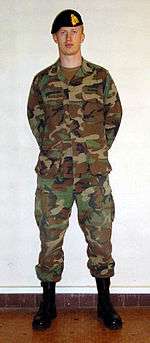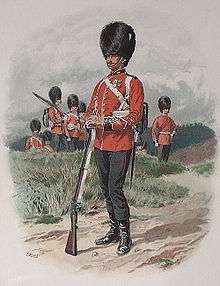Definify.com
Webster 1913 Edition
Uniform
U′ni-form
,Adj.
[L.
uniformis
; unus
one + forma
from: cf. F. uniforme
.] 1.
Having always the same form, manner, or degree; not varying or variable; unchanging; consistent; equable; homogenous;
as, the dress of the Asiatics has been
uniform
from early ages; the temperature is uniform
; a stratum of uniform
clay. Whewell.
2.
Of the same form with others; agreeing with each other; conforming to one rule or mode; consonant.
The only doubt is . . . how far churches are bound to be
uniform
in their ceremonies. Hooker.
Uniform matter
, that which is all of the same kind and texture; homogenous matter.
– Uniform motion
, the motion of a body when it passes over equal spaces in equal times; equable motion.
Hutton.
U′ni-form
,Noun.
A dress of a particular style or fashion worn by persons in the same service or order by means of which they have a distinctive appearance;
as, the
. uniform
of the artillery, of the police, of the Freemasons, etcThere are many things which, a soldier will do in his plain clothes which he scorns to do in his
uniform
. F. W. Robertson.
In full uniform
(Mil.)
, wearing the whole of the prescribed uniform, with ornaments, badges of rank, sash, side arms, etc.
– Uniform sword
, an officer’s sword of the regulation pattern prescribed for the army or navy.
U′ni-form
,Verb.
T.
1.
To clothe with a uniform;
as, to
. uniform
a company of soldiers2.
To make conformable.
[Obs.]
Sir P. Sidney.
Webster 1828 Edition
Uniform
U'NIFORM
a. [L. uniformis; unus, one, and forma, form.]1.
Having always the same form or manner; not variable. Thus we say, the dress of the Asiatics is uniform, or has been uniform from early ages. so we say, it is the uty of a christian to observe a uniform course of piety and religion.2.
Consistent with itself; not different; as, one's opinions on a particular subject have been uniform.3.
Of the same form with others; consonant; agreeing with each other; conforming to one rule or mode.How far churches are bound to be uniform in their ceremonies, is doubted.
4.
Having the same degree or state; as uniform temperature.Uniform motion. the motion of a body is uniform, when it passes over equal spaces in equal times.
Uniform matter, is that which is all of the same kind and texture.
Definition 2026
Uniform
uniform
uniform
See also: Uniform
English
Adjective
uniform (comparative more uniform, superlative most uniform)
- Unvarying; all the same.
- Consistent; conforming to one standard.
- 1593, Richard Hooker, Of the Laws of Ecclesiastical Polity, in 1830, The Ecclesiastical Polity and Other Works of Richard Hooker, page 313,
- The only doubt is, about the manner of their unity; how far Churches are bound to be uniform in their Ceremonies, and what way they ought to take for that purpose.
- 1593, Richard Hooker, Of the Laws of Ecclesiastical Polity, in 1830, The Ecclesiastical Polity and Other Works of Richard Hooker, page 313,
- (mathematics) with speed of convergence not depending on choice of function argument; as in uniform continuity, uniform convergence
- (of a polymer) Composed of a single macromolecular species.
- (geometry) (of a polyhedron) That is isogonal and whose faces are regular polygons; (of an n-dimensional (n>3) polytope) that is isogonal and whose bounding (n-1)-dimensional facets are uniform polytopes.
Usage notes
- As a description of polymers, the IUPAC prefers the term uniform to monodisperse.
Antonyms
Derived terms
Terms derived from uniform
|
Translations
unvarying
|
|
consistent
|
Noun

The uniform worn by a soldier from the Luxembourg Army
uniform (plural uniforms)
- A distinctive outfit that serves to identify members of a group.
- 1963, Margery Allingham, chapter 6, in The China Governess:
- ‘[…] I remember a lady coming to inspect St. Mary's Home where I was brought up and seeing us all in our lovely Elizabethan uniforms we were so proud of, and bursting into tears all over us because “it was wicked to dress us like charity children”. […]’.
- F. W. Robertson
- There are many things which a soldier will do in his plain clothes which he scorns to do in his uniform.
- 2013 July 19, Peter Wilby, “Finland spreads word on schools”, in The Guardian Weekly, volume 189, number 6, page 30:
- Imagine a country where children do nothing but play until they start compulsory schooling at age seven. Then, without exception, they attend comprehensives until the age of 16. […] There are no inspectors, no exams until the age of 18, no school league tables, no private tuition industry, no school uniforms. […]
-
- Phonetic equivalent for the letter U in the ICAO spelling alphabet, informally known as the NATO phonetic alphabet.
- A uniformed police officer (as opposed to a detective).
- 1996, S. J. Rozan, Concourse, Macmillan, ISBN 0-312-95944-3, page 265,
- Skeletor held the gun against Speedo’s head, held Speedo between himself and the cops who stood, motionless and futile, where they’d stopped. Robinson, Lindfors, Carter, three uniforms and I watched helpless as Skeletor, dragging Speedy with him, inched out the gate, started backing down the hill.
- 2001, Christine Wiltz, The Last Madam: A Life in the New Orleans Underworld, Da Capo Press, ISBN 0-306-81012-3, page 113,
- Four men flew out of it, three uniforms and one in what appeared to be an English riding outfit—boots, whip, the whole nine yards. […] He called out, “I’m the superintendent of police.”
- 2004, Will Christopher Baer, Penny Dreadful, MacAdam/Cage Publishing, ISBN 1-931561-81-8, page 81,
- Eyes to the front now and there was the body, a lump of black and brown. Moon counted three uniforms and a photographer, the medical examiner and his assistant.
- 1996, S. J. Rozan, Concourse, Macmillan, ISBN 0-312-95944-3, page 265,
Translations
distinctive outfit as a means of identifying members of a group
|
|
the letter "U" in ICAO spelling alphabet
Verb
uniform (third-person singular simple present uniforms, present participle uniforming, simple past and past participle uniformed)
- (transitive) To clothe in a uniform.
Dutch
Pronunciation
- IPA(key): /yniˈfɔrm/
Noun
uniform n (plural uniformen, diminutive uniformpje n)
- Uniform; a distinctive outfit.
Adjective
uniform (comparative uniformer, superlative uniformst)
Inflection
| Inflection of uniform | ||||
|---|---|---|---|---|
| uninflected | uniform | |||
| inflected | uniforme | |||
| comparative | uniformer | |||
| positive | comparative | superlative | ||
| predicative/adverbial | uniform | uniformer | het uniformst het uniformste |
|
| indefinite | m./f. sing. | uniforme | uniformere | uniformste |
| n. sing. | uniform | uniformer | uniformste | |
| plural | uniforme | uniformere | uniformste | |
| definite | uniforme | uniformere | uniformste | |
| partitive | uniforms | uniformers | — | |
Norwegian Bokmål
Noun
uniform m, f (definite singular uniforma or uniformen, indefinite plural uniformer, definite plural uniformene)
- a uniform
Norwegian Nynorsk
Noun
uniform f (definite singular uniforma, indefinite plural uniformer, definite plural uniformene)
- a uniform
Polish
Pronunciation
- IPA(key): [uˈɲifɔrm]
Noun
uniform m inan
- (rare) uniform
Declension
declension of uniform
Synonyms
Romanian
Etymology
Borrowing from Latin ūnifōrmis.
Pronunciation
- IPA(key): /ˌu.niˈform/
Adjective
uniform m, n (feminine singular uniformă, masculine plural uniformi, feminine and neuter plural uniforme)
Declension
declension of uniform
| singular | plural | ||||||
|---|---|---|---|---|---|---|---|
| masculine | neuter | feminine | masculine | neuter | feminine | ||
| nominative/ accusative |
indefinite | uniform | uniformă | uniformi | uniforme | ||
| definite | uniformul | uniforma | uniformii | uniformele | |||
| genitive/ dative |
indefinite | uniform | uniforme | uniformi | uniforme | ||
| definite | uniformului | uniformei | uniformilor | uniformelor | |||
Related terms
Related terms
|
|
|
Swedish
Pronunciation
Noun
uniform c
- Uniform; a distinctive outfit.
Declension
| Inflection of uniform | ||||
|---|---|---|---|---|
| Singular | Plural | |||
| Indefinite | Definite | Indefinite | Definite | |
| Nominative | uniform | uniformen | uniformer | uniformerna |
| Genitive | uniforms | uniformens | uniformers | uniformernas |
